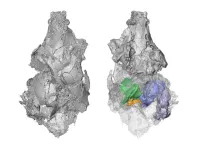(Press-News.org) A sex-specific panel of 10 proteins can pick up 18 different early stage cancers, representing all the major organs of the human body, finds a proof of concept study published in the open access journal BMJ Oncology.
The findings could kick-start a new generation of screening tests for early detection of the disease, say the researchers, particularly as there are many sex specific differences in cancer—including age at occurrence, cancer types, and genetic alterations—points out a linked editorial.
Cancer accounts for 1 in every 6 deaths around the globe, with nearly 60% of these deaths caused by cancers for which no screening test exists, note the researchers.
What’s more, even existing screening tests have considerable drawbacks, including invasiveness, expense, and low levels of accuracy for early stage disease, they add.
Specific blood proteins could be used for early detection and ongoing monitoring, but the currently available options lack sensitivity—accuracy of picking up those with cancer—and specificity—accuracy of excluding those without cancer, say the researchers.
To explore the potential use of plasma proteins, including those that are currently barely detectable, as biological signatures of solid tumours in specific organs, the researchers collected plasma samples from 440 people diagnosed with 18 different types of cancer before treatment, and from 44 healthy blood donors.
They then measured more than 3000 proteins strongly associated with cancer chemical pathways in each sample, using a technology deploying antibodies and a statistical algorithm in a 2-step process.
The first step involved detecting the biological signature of any cancer, and the second step involved identifying the tissue of origin and cancer subtypes—small cell and non-small cell cancers of the lung, for example.
Through a process of elimination, a panel of 10 sex specific proteins emerged that were differentially expressed among the plasma samples from cancer patients and healthy people.
The fact that these protein signatures differed significantly between men and women suggests that they are most likely sex-specific for all cancers, say the researchers.
By themselves, each individual protein was only moderately accurate at picking up early stage disease, but when combined with the other proteins in a panel they were highly accurate.
These proteins were able to pick up stage I-III disease and all types of cancer, but were particularly effective at picking up early stage disease.
They identified 93% of stage 1 cancers among the men and 84% of stage 1 cancers among the women, with 99% specificity and 90% sensitivity in the men and 85% sensitivity and 99% specificity in the women.
A panel of 150 proteins were able to identify the tissue of origin of most cancers in more than 80% of cases in both men and women.
Analysis of the plasma protein amounts showed that almost all of them were present at very low levels, highlighting the importance of low-level proteins to pick up pre-cancerous and early stage disease before a tumour has yet to have any substantial systemic impact, say the researchers.
They acknowledge the relatively small sample size of their study and the lack of information on co-existing conditions, potentially limiting the wider applicability of their findings. And despite advancements in proteomic techniques, the full range of proteins produced by a particular cell or organ isn’t yet known, they add.
Nevertheless they conclude: “Our new generation protein-based plasma test has shown high sensitivity in detecting a variety of early stage tumours in asymptomatic patients, making it a strong candidate for use as a population-wide screening tool that is not currently achievable with existing tests or techniques.”
In a linked editorial, Dr Holli Loomans-Kropp, of the College of Medicine, The Ohio State University, adds: “Although several problems need to be addressed before MCED [multi-cancer early detection] tests can be deployed at a population scale, a method to improve on current issues of sensitivity and specificity may be use of sex-specific detection panels.”
She continues: “Demonstrable sex-specific differences in cancer—including age of onset, cancer types and genetic alterations—suggest this approach would be useful.
“The widespread use of MCEDs may be a way down the road, but perhaps employing a strategy like sex-specific MCED panels could get the field moving a little faster.”
END
Sex-specific panel of 10 proteins can pick up 18 different early stage cancers
Could kickstart new generation of screening tests for early cancer detection, say researchers
2024-01-10
ELSE PRESS RELEASES FROM THIS DATE:
Predominantly plant-based or vegetarian diet linked to 39% lower odds of COVID-19
2024-01-10
A predominantly plant-based or vegetarian diet is linked to 39% lower odds of COVID-19 infection, finds research published in the open access journal BMJ Nutrition Prevention & Health.
The findings prompt the researchers to suggest that a diet high in vegetables, legumes, and nuts, and low in dairy products and meat may help to ward off the infection.
Several studies have suggested that diet may have an important role in the evolution of COVID-19 infection, as well as in the factors that heighten the risk of its associated ...
Early menopause and HRT among hormonal factors linked to heightened rheumatoid arthritis risk
2024-01-10
Early menopause—before the age of 45—taking hormone replacement therapy (HRT), and having 4 or more children are among several hormonal and reproductive factors linked to a heightened risk of rheumatoid arthritis in women, finds a large long term study published in the open access journal RMD Open.
Women are more susceptible to this autoimmune disease than men, note the researchers. They are 4–5 times as likely as men to develop rheumatoid arthritis under the age of 50, and twice as likely to do so between the ages of 60 and 70. And the disease seems to take a greater physical toll on women than it does on men.
While ...
City of Hope Children’s Cancer Center, Children’s Oncology Group conduct largest clinical trial seeking to prevent heart failure among childhood cancer survivors
2024-01-10
LOS ANGELES — Physicians at City of Hope, one of the largest cancer research and treatment organizations in the United States, in cooperation with the Children’s Oncology Group (COG), have conducted the largest clinical trial to date seeking to reduce the risk of people who have survived childhood cancer from developing heart failure. The findings published in The Lancet Oncology show that the blood vessel relaxing medication carvedilol is safe for childhood cancer survivors to take and may improve important markers of heart injury sustained as a result of chemotherapy exposure.
One devastating ...
New research sheds light on an old fossil solving an evolutionary mystery
2024-01-10
New York, January 9, 2024 — A research paper published in Royal Society’s Biology Letters on January 10 has revealed that picrodontids —an extinct family of placental mammals that lived several million years after the extinction of the dinosaurs—are not primates as previously believed.
The paper—co-authored by Jordan Crowell, an Anthropology Ph.D. candidate at the CUNY Graduate Center; Stephen Chester, an Associate Professor of Anthropology at Brooklyn College and the Graduate Center; ...
No laughing matter: Leadership critical to help address NHS retention crisis
2024-01-10
Frontline healthcare workers in busy hospitals feel that they are “just rearranging the deckchairs on the Titanic” according to new research into the impact of under-resourced and high-pressure emergency hospital departments in the UK.
A study from the Royal College of Emergency Medicine and University of Bath, led by clinical psychologist Dr Jo Daniels in collaboration with colleagues at UWE Bristol and the University of Bristol, argues that hospitals need better leadership to help change cultures and support people’s basic needs.
In addition to reflections ...
Acidity of Antarctic waters could double by century’s end, threatening biodiversity
2024-01-10
The acidity of Antarctica’s coastal waters could double by the end of the century, threatening whales, penguins and hundreds of other species that inhabit the Southern Ocean, according to new research from the Univeristy of Colorado Boulder.
Scientists projected that by 2100, the upper 650 feet (200 meters) of the ocean—where much marine life resides—could see more than a 100% increase in acidity compared with 1990s levels. The paper, appeared Jan. 4 in the journal Nature Communications.
“The findings are critical for our understanding ...
Injectable hydrogel electrodes open door to a novel painless treatment regimen for arrhythmia
2024-01-09
HOUSTON (Jan 9, 2024)— A breakthrough study led by Dr. Mehdi Razavi at The Texas Heart Institute (THI), in collaboration with a biomedical engineering team of The University of Texas at Austin (UT Austin) Cockrell School of Engineering led by Dr. Elizabeth Cosgriff-Hernandez, sets the foundation of a ground-breaking treatment regimen for treating ventricular arrhythmia. Their study published in Nature Communications demonstrates the design and feasibility of a new hydrogel-based pacing modality.
The urgent need for an effective therapeutic ...
Inspired by Greek mythology, this potential drug shows promise for vanquishing Parkinson’s RNA in early studies
2024-01-09
JUPITER, Fla. — Like the Greek mythological beast with a snake’s tail and two ferocious heads, a potential Parkinson’s medicine created in the lab of chemist Matthew Disney, Ph.D., is also a type of chimera bearing two heads. One seeks out a key piece of Parkinson’s-causing RNA, while the other goads the cell to chop it to pieces for recycling.
The research is described in the Jan. 9 issue of the Proceedings of the National Academy of Sciences, or PNAS.
Parkinson’s is a frustrating and all too common disease. Slowly, people with Parkinson’s lose brain cells and other neurons needed to make the neurotransmitter dopamine. This progressive ...
Plant warfare: the crucial function of Nrc proteins in tomato defense mechanisms
2024-01-09
In the fascinating world of plant biology, an innovative study recently featured on the cover of The Plant Journal has been turning heads. The research delves into the intricate defense mechanisms of tomatoes against the notorious bacterial pathogen, Pseudomonas syringae pv. tomato (Pst). It's a classic tale of nature's arms race: as pathogens evolve to outsmart plant defenses, plants counter with more sophisticated immune responses.
The study is based on research conducted by scientists in Dr. Greg Martin’s lab ...
NASA’s Webb finds signs of possible aurorae on isolated brown dwarf
2024-01-09
Astronomers using NASA’s James Webb Space Telescope have found a brown dwarf (an object more massive than Jupiter but smaller than a star) with infrared emission from methane, likely due to energy in its upper atmosphere. This is an unexpected discovery because the brown dwarf, W1935, is cold and lacks a host star; therefore, there is no obvious source for the upper atmosphere energy. The team speculates that the methane emission may be due to processes generating aurorae.
These findings are being presented at the 243rd meeting of the American Astronomical Society in New Orleans.
To help explain the mystery of the infrared ...
LAST 30 PRESS RELEASES:
Unraveling the mystery of why some cancer treatments stop working
From polls to public policy: how artificial intelligence is distorting online research
Climate policy must consider cross-border pollution “exchanges” to address inequality and achieve health benefits, research finds
What drives a mysterious sodium pump?
Study reveals new cellular mechanisms that allow the most common chronic cardiac arrhythmia to persist in the heart
Scientists discover new gatekeeper cell in the brain
High blood pressure: trained laypeople improve healthcare in rural Africa
Pitt research reveals protective key that may curb insulin-resistance and prevent diabetes
Queen Mary research results in changes to NHS guidelines
Sleep‑aligned fasting improves key heart and blood‑sugar markers
Releasing pollack at depth could benefit their long-term survival, study suggests
Addictive digital habits in early adolescence linked to mental health struggles, study finds
As tropical fish move north, UT San Antonio researcher tracks climate threats to Texas waterways
Rich medieval Danes bought graves ‘closer to God’ despite leprosy stigma, archaeologists find
Brexpiprazole as an adjunct therapy for cognitive dysfunction in schizophrenia
Applications of endovascular brain–computer interface in patients with Alzheimer's disease
Path Planning Transformers supervised by IRRT*-RRMS for multi-mobile robots
Nurses can deliver hospital care just as well as doctors
From surface to depth: 3D imaging traces vascular amyloid spread in the human brain
Breathing tube insertion before hospital admission for major trauma saves lives
Unseen planet or brown dwarf may have hidden 'rare' fading star
Study: Discontinuing antidepressants in pregnancy nearly doubles risk of mental health emergencies
Bipartisan members of congress relaunch Congressional Peripheral Artery Disease (PAD) Caucus with event that brings together lawmakers, medical experts, and patient advocates to address critical gap i
Antibody-drug conjugate achieves high response rates as frontline treatment in aggressive, rare blood cancer
Retina-inspired cascaded van der Waals heterostructures for photoelectric-ion neuromorphic computing
Seashells and coconut char: A coastal recipe for super-compost
Feeding biochar to cattle may help lock carbon in soil and cut agricultural emissions
Researchers identify best strategies to cut air pollution and improve fertilizer quality during composting
International research team solves mystery behind rare clotting after adenoviral vaccines or natural adenovirus infection
The most common causes of maternal death may surprise you
[Press-News.org] Sex-specific panel of 10 proteins can pick up 18 different early stage cancersCould kickstart new generation of screening tests for early cancer detection, say researchers




